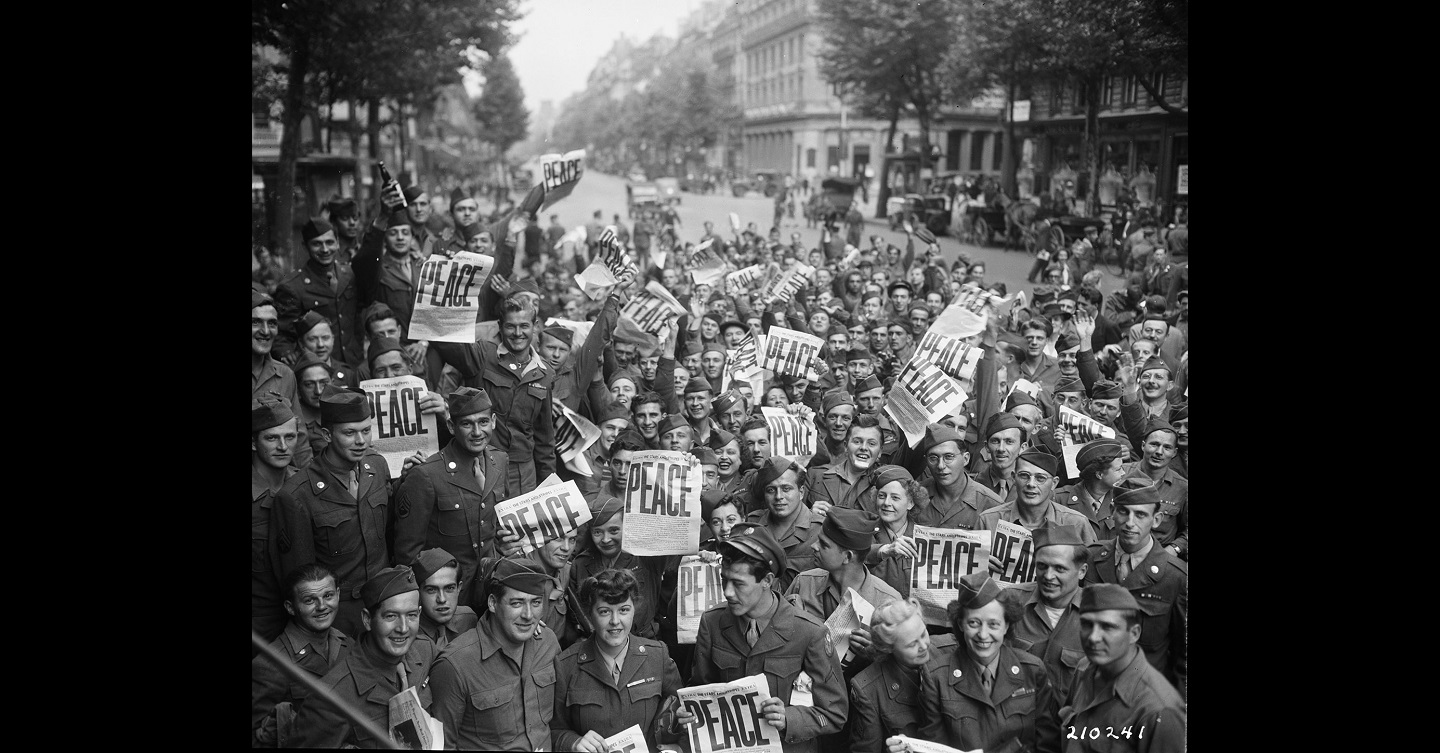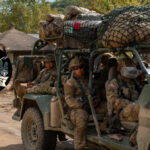
The Army prides itself on being able to learn, but it also has shown throughout history it also forgets pretty quick too.
A BETTER PEACE welcomes Brian Linn and Conrad Crane to discuss the inter-war periods throughout U.S. history and what they’ve meant to the further development of the U.S. Army. WAR ROOM Senior Editor JP Clark joins them to look at how post-war versus pre-war mindsets have guided leadership over time.
Podcast: Download
Brian Linn is a Professor of History and the Ralph R. Thomas Professor in Liberal Arts, at Texas A&M University. He specializes in military history and war and society in the 20th century. Con Crane is a military historian with the Army Heritage and Education Center. COL JP Clark is a student in the AY20 resident class at the U.S. Army War College and a WAR ROOM Senior Editor. The views expressed in this presentation are those of the speakers and do not necessarily reflect those of the U.S. Army War College, U.S. Army, or Department of Defense.
Photo Description: American servicemen and women gather in front of “Rainbow Corner” Red Cross club in Paris to celebrate the conditional surrender of the Japanese on August 15, 1945.
Photo Credit: U.S. Army Photo





Thank you for this fascinating and enlightening conversation that has so much to offer historians and current officers. I think this debate might also be informed by analyzing how both the US Army and the American public/politicians classify when a war is “over,” which naturally alters how we view time periods through the prism of pre or postwar. Is it when the “shooting war” stops? When a peace treaty is concluded? When America achieves its strategic objectives (provided those were defined in the first place)? Or perhaps when the last US soldier leaves what was the combat zone?
Engaging with this question might help illuminate why the Army focuses on certain postwar “lessons learned” to the detriment of others. I am influenced here by my recent study of the post-World War I US Occupation of Germany. For almost all Americans (and perhaps for the Army as an institution), World War I ended in November 1918, or at the very latest with the Treaty of Versailles. Yet the Third Army and later the AFG remained in the Rhineland until 1923 and struggled to address many of the challenges of transforming victories on the battlefield into desired peacetime outcomes. A similar process occurred after the Civil War; a common complaint for Civil Affairs Officers in Germany was that they had access to almost no information or guidance stemming from the Army’s role on the ground during Reconstruction, or from other experiences with military government. Does the prewar – postwar dichotomy obscure the Army’s efforts to help “win the peace” by leaving these eras in a sort of ill-defined middle ground?
For what it is worth, I agree wholeheartedly! You point out another wrinkle in which our neat categorizations can cause some major problems. “The war is over. Everything is done…right?” As you note, the answer is probably not. Having seen some drafts of Brian’s work, it is just those sort of persisting commitments and problems that make the ten years after a war a pretty trying time for those in uniform. Along with all of the personnel turbulence, big new improvements rarely take place during those windows.
Thanks for listening and engaging on the comment page!
There may be only two basic ways to view and consider what has been called “a better peace” and, thus, may be only two basic ways to take action to achieve one’s objective as to such objectives; these being:
1. Things (who runs things and how and why they do this, and the way of life, the way of governance, the values, etc., associated with this such version of “order”) are generally considered TO BE CORRECT and, thus, these are, following conflict, purposefully returned to essentially the same way they were before the conflict began. Or:
2. Things (see the criteria I outline immediately above) are generally considered TO BE IMPROPER AND/OR UNTENABLE and, thus, these are purposefully altered — to some great or at least some significant degree after conflict — this, so as to bring about desired/required “improvements”/”changes.”
These two basic views — of how “a better peace” has been understood — these would seem to be described by Sir Adam Roberts in the first two paragraphs of his 2006 “Transformative Military Occupations: Applying the Laws of War and Human Rights:”
“Within the existing framework of international law, is it legitimate for an occupying power, in the name of creating the conditions for a more democratic and peaceful state, to introduce fundamental changes in the constitutional, social, economic, and legal order within an occupied territory? …
These questions have arisen in various conflicts and occupations since 1945 — including the tragic situation in Iraq since the United States–led invasion of March–April 2003. They have arisen because of the cautious, even restrictive assumption in the laws of war (also called international humanitarian law or, traditionally, jus in bello) that occupying powers should respect the existing laws and economic arrangements within the occupied territory, and should therefore, by implication, make as few changes as possible.”
With these such understandings of “a better peace” now before us, how now might we view:
a. The title and information presented in our article above “IT’S ONLY A PRE-WAR PERIOD IN HINDSIGHT.” And, indeed, view:
b. The title and information in what may be a related article currently here at the “War Room;” these being,”LIBERATION FROM THE POINT OF VIEW OF THE LIBERATED?”
Topic is really excellent.
Thanks! Glad you enjoyed it. We were lucky to have a historian of Brian’s caliber take the time to visit the War Room.
Using the information that I have provided above, let us consider the situation that we seem to find ourselves in today.
This being that, our conflicts today, both here at home (as relates to our own governments and populations) and there abroad (as relates to the governments and populations of other states and societies), these conflicts seem to come before us today as a result of our domestic and our foreign policies, which, after the Cold War and until 2017:
a. Appear to have been designed to alter the political, economic, social and/or values arrangements of the states and societies of the world; this, so that same might:
b. Better provide for — and better benefit from — such things as globalism, globalization and the global economy.
Thus, with these such “policy” gauntlets formally thrown down post-the Cold War, the classic battle began anew — for example as may have been described by Robert Gilpin in the “Introduction” (see Page 3) of his “The Challenge of Global Capitalism: The World Economy in the 21st Century:”
“Capitalism is the most successful wealth-creating economic system that the world has ever known; no other system, as the distinguished economist Joseph Schumpeter pointed out, has benefited ‘the common people’ as much. Capitalism, he observed, creates wealth through advancing continuously to every higher levels of productivity and technological sophistication; this process requires that the ‘old’ be destroyed before the ‘new’ can take over. Technological progress, the ultimate driving fore of capitalism, requires the continuous discarding of obsolete factories, economic sectors, and even human skills. The system rewards the adaptable and the efficient; it punishes the redundant and the less productive.
This ‘process of creative destruction,’ to use Schumpeter’s term, produces many winners but also many losers, at least in the short them, and poses a serious threat to traditional social values, beliefs, and institutions. … Threatened individuals, groups, or nations (likewise and accordingly) constitute an ever-present force that could overthrow or at least significantly disrupt the capitalist system.”
(Item in parenthesis above is mine.)
As one might expect in “threat” circumstances such as these, the “interests” of various “conservative” groups around the world — to maintain, protect and/or to even restore such things as one’s traditional social values, beliefs and institutions — these can come to be:
a. More aligned with the similar interests of one’s (former?) competitors and enemies; for example, with the similar interests of Russia. And:
b. Less aligned with the more-progressive interests of one’s (former?) partners and allies; for example, with the more-progressive interests of Germany.
To illustrate this such phenomenon, consider the following three examples; wherein, at Examples No. 1 and 2 below, we seem to see a new alignment of (conservative?) interests — of the U.S. and Russia — while at Example No. 3 below, we seem to see a (thus understandable) new divergence of interests — between the U.S. and Germany.
Example No. One: “Compounding it all, Russia’s dictator has achieved all of this while creating sympathy in elements of the Right that mirrors the sympathy the Soviet Union achieved in elements of the Left. In other words, Putin is expanding Russian power and influence while mounting a cultural critique that resonates with some American audiences, casting himself as a defender of Christian civilization against Islam and the godless, decadent West.” (See the “National Review” item entitled: “How Russia Wins” by David French.)
Example No. Two: “Russian efforts to weaken the West through a relentless campaign of information warfare may be starting to pay off, cracking a key bastion of the U.S. line of defense: the military. While most Americans still see Moscow as a key U.S. adversary, new polling suggests that view is changing, most notably among the households of military members.”
(See the “Voice of America” item entitled: “Pentagon Concerned Russia Cultivating Sympathy Among U.S. Troops” by Jeff Seldin.)
Example No. Three: “In an interview published late Sunday, (American Ambassador to Germany Robert) Grenell told far-right news site Breitbart he ‘absolutely wants to empower other conservatives throughout Europe’ and encourage people to rise up against ‘elites.’ ”
(Item in parenthesis above is mine. See the “Politico” article “German Politicians Call on US to Withdraw Ambassador Richard Grenell” — under fire for saying he’ll seek to ’empower’ anti-establishment parties across Europe — by Benas Gerdziunas dated June 5, 2018. As we know, Grenell has recently been appointed as the United States Acting Director of National Intelligence.)
Thus, given the information that has been provided here:
a. How now do we now see (one of or both?) of the two versions of “a better peace” — that I describe in my original/initial comment above — playing out today?
b. Can we, likewise, consider these matters from the perspective of “IT’S ONLY A PRE-WAR PERIOD IN HINDSIGHT?”
c. In this light, also, how might we now view such things as “LIBERATION FROM THE POINT OF VIEW OF THE LIBERATED?”
Thanks for listening and putting so much care and thought into your comments. You raise some excellent points. I’m glad that you found the podcast stimulating.